As the next group gets set to start the Precision Nutrition Certification (the presale list is now open for the program starting Wednesday, March 12th, 2025) I’ve been looking over some of the questions I’ve received from students over the last few months.
Today I thought I’d answer one question that has come up quite a few times, and it’s this:
“What resources do you recommend for learning how to be a better coach?”
That is a very, very good question. My bookshelf is crammed with texts from all kinds of different fields and subject areas; in my web browser I’ve got bookmarks to probably hundreds of different sites.
But rather than just post a massive laundry list, today I’ll share with you a half-dozen books that I’d highly recommend for any serious trainer or coach. In a future blog post, I’ll put together a list of recommended websites.
[Note: This is a list of books about coaching and influencing what your clients do outside of the gym, in the 165 hours you don’t spend with them — because to me that ability is the mark of a true coach. I may post my recommendation of exercise-related texts at some point, but that’s another topic altogether.]
Let’s get started.
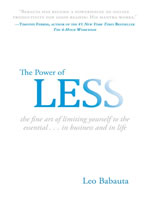
1. The Power of Less, by Leo Babauta
Truly an outstanding little book describing the author’s analysis of his own growth and change. If you want to understand how change happens and how new habits are actually formed in the real world, there isn’t a better book than this one. A short read, chock full of simple, practical — and often counter-intuitive — insight into the transformation process. We recommend it to all our Lean Eating clients, and if you want to learn how to coach people who are struggling with change, you’d do well to read it too.
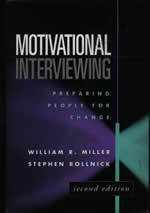
2. Motivational Interviewing, by William R Miller & Stephen Rollnick
Most trainers and coaches are utterly lost when it comes to talking to clients, or understanding how to help them change. Spend some time eavesdropping on a conversation between a trainer and a client in a commercial gym and you will likely hear either a) the trainer trying to impress the client by sharing everything he or she has ever learned about fitness in one breathless soliloquy, or b) the client talking about what they did last weekend.
That’s a shame, and a missed opportunity. Because few people realize how important the dialog between coach and client really is, and what a key role it plays in the transformation process. Motivational Interviewing is a very specific style of dialog designed to provide clients with a safe place to contemplate change — and all coaching, whether with elite athletes or with rank beginners, is about facilitating change. The truth is that, in general, the way you speak to your clients is either encouraging change or deepening resistance, and if you haven’t read MI, you’ll be surprised to learn that much of what you’re doing has the effect of actually making change LESS likely. Read this book and start using bits of it with clients today; if you don’t, you’re doing your clients a major disservice.
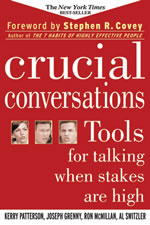
3. Crucial Conversations, by Kerry Patterson et al.
Always pandering to a client is a sign of weakness in a coach. But so is berating them or being completely insensitive to their needs. A great coach must be able to hold clients accountable, and that inevitably means discussing difficult things (eating habits, behavioral patterns, problems with a spouse, compliance issues, etc.).
But how do you learn to call a spade a spade without offending someone — or more to the point, how do you actually deepen a relationship with someone while explicitly discussing things that they may prefer not to hear?
Crucial Conversations is the best book I’ve found on the topic, and I’ve read quite a number. The authors describe a step-by-step process, from recognizing when the discussion is getting critical (i.e., becoming aware of the emotions at stake) to being honest without being hurtful, to settling an issue and moving forward in agreement. Putting even just one or two of their techniques into practice with your clients will make you a far better coach.
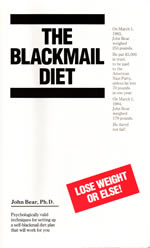
4. The Blackmail Diet, by John Bear
This is a really hard one to track down, because it’s been out of print for so long. I just happened upon it a few years ago in a used book store and picked it up for $2 based on the name alone. What a title.
The book itself doesn’t disappoint. The author, a PhD graduate from Michigan State who had battled with obesity and dieting most of his adult life, has an epiphany: obesity is a problem best solved psychologically.
(Note: I disagree with that assessment, and of course I’m simplifying his position, but it’s quite true that coaches and people in general pay far too little attention to non-physiological factors involved in body transformation.)
So he comes up with a plan: he signs a contract with a lawyer and puts $5,000 in escrow (i.e., at the mercy of the lawyer and completely out of his control). The contract states that if in a year’s time he doesn’t lose 70 lbs, the lawyer is legally obliged to give all the money to the American Nazi Party. Well, of course, for most sane people that’s an entirely unacceptable outcome, and sure enough a year later he had lost the full 70 lbs.
He goes on to describe all kinds of similar weight loss experiments revolving around the same concept: people make a legally-binding pledge to either lose weight or face an unpalatable consequence. Now I’m not suggesting that you work this into your practice. But it’s a fascinating read for a coach, with two very important lessons: 1) when people have enough leverage on themselves, anything is possible; 2) clients have to make decisions and commitments when the motivation is high that will have lasting impact when the motivation wanes — which it inevitably will.

5. Influence, by Robert Cialdini
A classic collection of psychology experiments and anecdotes examining how influence actually works. Cialdini weaves a solid argument that people are hard-wired to look for very specific cues before they are convinced of something. Well, your clients will be examining everything about you and your practice, even in ways you might not have anticipated.
For example, people look for social proof before adopting a new idea; in short, they ask: has this worked for anyone else? I’m always shocked by how few coaches can demonstrate the value of their work, either with case studies, with before/after pictures, or better yet, by directly introducing a new client to an older one who has already gone through the process. I highly recommend picking up this book if only to understand the thought process your clients go through when evaluating your services. And as an aside: if you aren’t documenting your work with clients, start now; and if you are but want to generate more impressive results to show off, I’ve got the book for you:
6. The Essentials of Sport and Exercise Nutrition, by John Berardi & Ryan Andrews
As an author, I’m obviously biased, but if I may say so myself, this the only book on nutrition you will ever need. A completely new 500-page academic textbook that Ryan Andrews and I wrote from the ground up, because frankly nothing like it existed. I’ve spent the lion’s share of my academic and professional careers pulling pieces from the dozen or so different fields of study involved in body transformation, from molecular biology to food science to behavioral psychology, just to name a few. And this is the text I wish I had when I started my career.
To be an effective fitness professional — and by that, I mean to be able to help someone build their ideal body through exercise, nutrition and supplementation — you don’t need to master all of those fields. In fact, delving too deeply into any particular one of them at the exclusion of the others leaves you open to the hammer and nail problem (“If all you have is a hammer, everything looks like a nail.”). But you do need to master the PARTS of each of those fields relevant to body transformation.
That’s what the Precision Nutrition Certification is about: turning trainers and strength coaches into true fitness professionals — into elite body transformation experts. Because in the 3-5 hours you have with a client each week (if you’re lucky), you can either teach them to exercise or you can guide them to the body they never thought they could have. The two are very different things.
If you’re a coach, or you want to be…
You can help people build sustainable nutrition and lifestyle habits that will significantly improve their physical and mental health—while you make a great living doing what you love. We'll show you how.
If you’d like to learn more, consider the PN Level 1 Nutrition Coaching Certification. (You can enroll now at a big discount.)
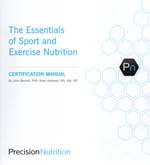
Share